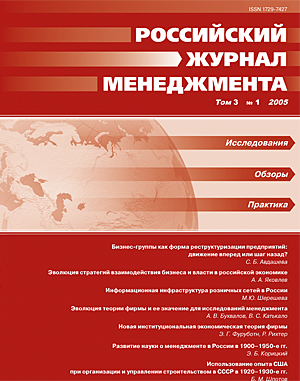Evolution of Business-State Interaction Strategies in the Russian Economy
Abstract
Co-existence of the two basic strategies of the Russian companies — isolation from the state and close cooperation with the state — is discussed and confirmed in this article. The author analyzes influencing factors and possible ways of realization of these strategies and draws the analogy with exit and voice strategies explored by A. Hirsman. It is shown that under the conditions of weak state performance both discussed strategies are informal and lead either to tax evasion and moving of business activities into the shadow economy or to the «state capture» phenomenon. Both privatization of the state and its evasion result in the budget crisis as well as in drastic social and political shocks which bring out the demand for the strong state in the business community itself. However, in the absence of political competition and democratic control mechanisms increasing of the state power takes place in the form of bureaucratic consolidation along
with creating the preconditions for informal «business capture» by the state authorities. Nevertheless, high0level openness of the economy and heterogeneity of the state body itself provide the business with the wide range of possible strategies aimed at the interaction with the state. The article explores the hypothesis of these strategies becoming more formal and public comparing to the 1990s. Isolation from the state will take form of the legal business internationalization (including selling shares to foreign investors, Russian direct investment into foreign economies, etc.). Cooperation with the state will be more efficient in case of switching from traditional individual lobbying of private interests to rational collective actions aimed at providing necessary grounds for sustainable economic development in their sectors, industries and regions.
Downloads
References
Downloads
Published
How to Cite
Issue
Section
License
Articles of the Russian Management Journal are open access distributed under the terms of the License Agreement with Saint Petersburg State University, which permits to the authors unrestricted distribution and self-archiving free of charge.





